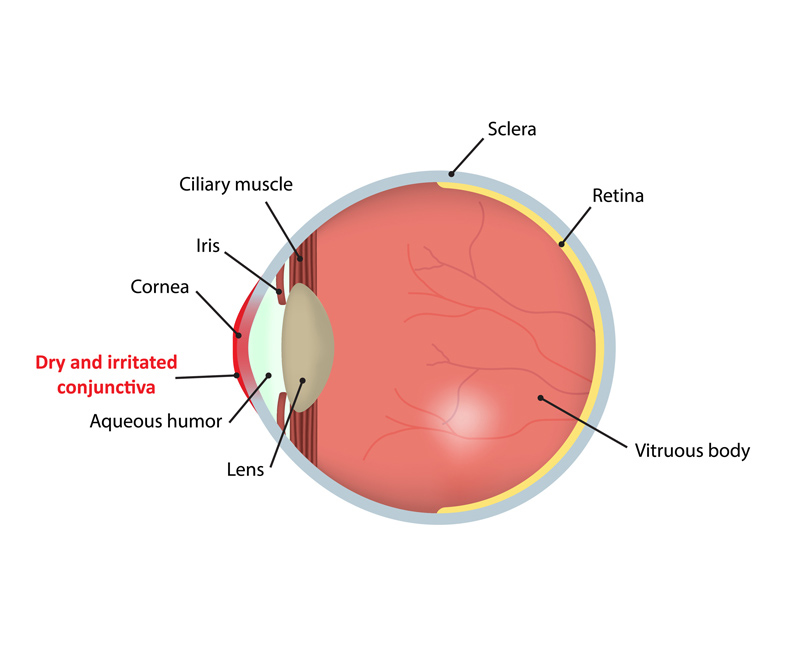Dry Eye Specialist & Treatment in N. Colorado Springs, CO
Dry Eye Doctor
Dry Eye Specialist & Treatment in Colorado Springs, CO
Dry Eye Doctor

Find relief from dry, itchy, irritated eyes
In our dry climate, experiencing dry eyes is common, whether it’s from computer use, outdoor activities, wearing contact lenses, or age-related changes. We provide solutions beyond just eye drops or drinking more water. Let our Dry Eye Specialists in Colorado Springs, Co help you find long-lasting relief!

What is Dry Eye?
Dry eye disease is a chronic condition when your tears are not sufficient to keep the front surface of the eye lubricated properly. When your eyes do not produce optimal tears to keep them moisturized, dry eye occurs. Dry eye is a common condition where the symptoms can mimic those of other issues like eye allergies, so it is frequently under-diagnosed.
Tears help give you clear vision, lubricate your eyes, protect against infection, and help with wound healing, so the proper production and drainage of tears is an important part of maintaining optimal eye health and vision.
What Are the Symptoms of Dry Eye?
If you are experiencing the following symptoms, you may have dry eye syndrome:
- Burning, stinging, or itching eyes
- A scratchy or sandy feeling in your eyes
- Increased sensitivity to light
- Eye pain or redness
- Stringy mucus or discharge from your eyes
- Fluctuating vision
Symptoms may be made worse by activities like driving, reading, computer use, or watching TV, as you blink less often at these times. When your eyes are not properly lubricated, they are more likely to dry out and become irritated.

What Causes Dry Eye?
Each case of dry eye is unique. Identifying the root cause of the dry eye is vital to getting the right treatment. Here are some of the common reasons people develop dry eye disease.
Blepharitis
Blepharitis is an inflammation of the eyelids. The affected area is usually at the very edge of the eyelid, located at the base of the eyelashes. This inflammation causes this area to swell up, appear red and inflamed, and produce infected debris called scurf. It’s a common condition, particularly if you have oily skin, dandruff, or rosacea. Some people describe blepharitis as “psoriasis of the eyelids”. Blepharitis can cause the symptoms of dry eye.
Diabetes
Diabetes affects the oil glands in the eyelids which are responsible for preventing the watery component of the tears from evaporating too quickly after blinking. High blood glucose levels can also damage nerves in the eyes, specifically in the lacrimal gland and on the cornea, and these nerves are necessary for tears to remain on the front surface of the eye. When these nerves are damaged, this can cause insufficient blood flow to the area, and then a decrease in tear production.
Meibomian Gland Dysfunction
One of the most common causes of dry eye is meibomian gland dysfunction, or MGD.
The meibomian glands are small oil glands located in the upper and lower eyelids and secrete oil which coats the surface of the eyes and prevents moisture from evaporating. Water, oil, and mucin layers make up the tear film, and this tear film is what keeps the surface of the eye healthy.
More about MGD
Meibomian gland dysfunction (MGD) occurs when the oil-producing meibomian glands are clogged and unable to create a healthy tear film to keep the eyes properly lubricated.
Symptoms of MGD include dryness, burning, itching, sensitivity to light, watery eyes, red eyes, the development of chalazion/styes, blurry vision, and eye crusting or stickiness.
Sjogren’s Syndrome
Sjogren’s Syndrome is a systematic autoimmune disease that affects the entire body. One characteristic of this disease is that it causes the immune system to attack the moisture-producing cells in the body, so it’s common for people who have Sjogren’s Syndrome to also have a dry mouth, dry eye, and dry skin.
Thyroid disorder
People who have thyroid disorders, including Graves disease, or hyperthyroidism, in which the thyroid makes too many hormones, or Hashimoto’s thyroiditis, also known as hypothyroidism, in which there are low levels of hormones, can suffer from dry eye as a result.
More about thyroid disorder
The thyroid is responsible to maintain hormonal and metabolic balance in the body, so when the thyroid isn’t functioning properly, it affects the entire body, including your eyes. For people who have thyroid disorders, treating the thyroid alone won’t take care of dry eye. Even though the thyroid disorder caused the dry eye, the dry eye is a separate problem, and requires a separate approach and treatment plan.
Contact lenses
Sometimes, people who wear contact lenses can develop symptoms of dry eye. These symptoms can be worsened if there is improper contact lens hygiene, or if there is an overwearing of the contact lenses.
Medications
Symptoms of dry eye can be a side effect of certain medications which treat conditions such as colds, allergies, high blood pressure, and depression. These medications can impact the functionality of the tear ducts in your eyes and lead to the development of dry eye syndrome.
Environmental Factors
Some people suffer from the change in seasons, especially in the spring, summer, and fall, because there are a high number of pollens and allergens in the air and they have an autoimmune response to the allergens, which results in ocular inflammation and symptoms of dry eye.
Use of Digital Devices
People who spend most of their working hours looking at computer or tablet screens can develop symptoms of dry eye, because we tend to blink less often when concentrating on a digital screen, and even when we do blink, the blinking is what’s known as partial blinking, and this type of blinking isn’t as effective at keeping the eyes moist.
Dry Eye Treatment Options in Colorado Springs, CO
Our qualified eye doctors are trained in diagnosing and treating dry eye syndrome. Through the evaluation and tests performed at a comprehensive eye exam, your optometrist will gather the information needed to determine if you may have dry eye. If a diagnosis is made, your doctor will work with you to put a treatment plan in place tailored to your unique vison and ocular health needs.
If you think you may be experiencing dry eye, contact our office to schedule an eye exam with the optometrists at Spectrum Eye Care in N. Colorado Springs, CO.
